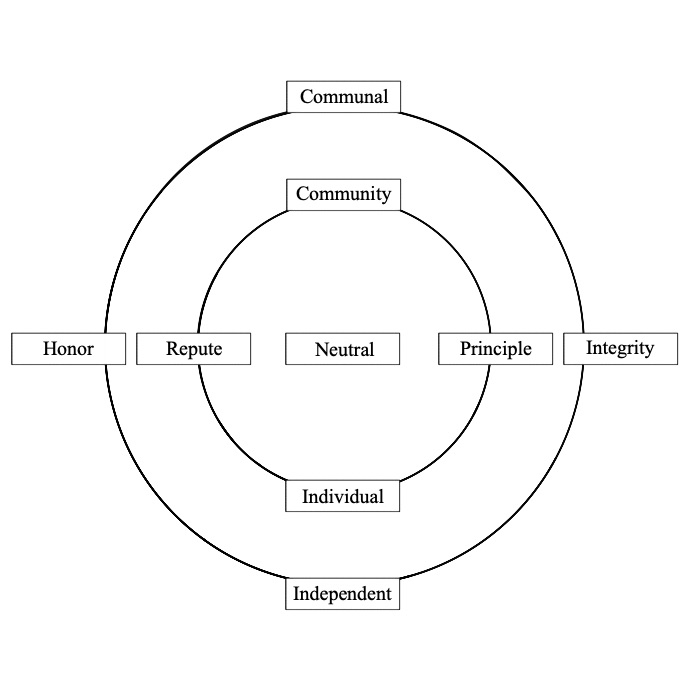Alignment
Below is the new, proposed alignment chart with two axes radiating out from the center with different intensities.

Using Alignment
Alignment is not static. This cannot be said enough. As you continue through life, your views and values change. Situations push you to make choices and take actions, even taking no action is a choice, which change how you see yourself and how others see you.
It is encouraged that over the course of a game, particularly longer games with multiple sessions, that you revisit your character’s values: have they been challenged, how have they been challenged, has that changed what they hold dear, how might it have impacted these values?
Honor to Integrity
This axis is about motivation and what drives a creature; “the why.”
- Honor is about upholding your values for the sake of how you are seen at any cost. Maintaining your public image is extremely important to you.
- Repute is a milder form of Honor, where what others perceive you to be is important but if it means breaking a value which you hold as extremely important, you will choose to break your image over breaking your moral code.
- Principle is a more moderate form of Integrity. You still follow your inner values, ignoring public opinion, but there are some ideals for which you will forgo your moral code in favor of how others see you.
- Integrity is about remaining true to what you hold important, public image be damned.
Communal to Independent
This axis is about mindset and what a creature values; “the what.”
- Communal is a view that follows the idea of ‘one for all,’ no matter the consequences. When faced with such a situation, you always choose the suffering of a few for the benefit of everyone.
- Community is a moderate take on Communal, community favors the success and promotion of everyone over an individual. Yet, when push comes to shove, you may not always take actions that benefit the greater good.
- Individual is a milder form of Independent. You tend to value actions that benefit yourself over others but sometimes deviate from this to assist others at your own expense.
- Independent is focused on self and you always choose actions that benefit yourself, whether or not those actions help or hurt others.
Neutral
This alignment is not a viewpoint that does not care about actions. On the contrary, if you are neutral, you care about how others view you, but you also listen to your inner values. Similarly, you value others and your own life equally and take actions that both benefit or hurt yourself in conjunction with those that benefit or hurt others. If you are neutral, you might live your life without having to make decisions that conflict or strengthen one direction on the chart over another. Often though, you will have to make decisions that force you to make choices between two values that you hold, and which will change you.
Beyond the Chart
Creatures are typically a combination of their motivation and values and list both of their alignment directions. As an example, a creature who values themselves above all others is Independent aligned. Their motivation is driven mostly by what others think; however, they do possess some intrinsic values making them Repute. The combination of these two alignments gives the creature a Repute Independent alignment.
Languages
All characters start off with knowing Common, or in agreement with your GM, one other language more appropriate to your character. Some might start off with more than one language: you know a number of extra languages in addition to your first language equal to your Intelligence Modifier.
But the number of languages you start off with does not need to be your final list. You can gain access to more languages by using the Society skill. If you are proficient in Society, you know a number of languages equal to your Proficiency Score. Each time your Proficiency Score increases, you have become passably fluent in a new dialect.
The following are common game languages but, do not forget, that the world you play in might have different or additional languages.
| Language | Spoken By |
| Abyssal | Demons, creatures from the Abyss |
| Aklo | Derros, creatures from other planes or planets, some creatures with the fey tag (there are a lot of variations within Aklo) |
| Aquan | Aquatic or water dwelling creatures, creatures from the Plane of Water |
| Auran | Flying or air dwelling creatures, creatures from the Plane of Air |
| Celestial | Angels, creatures from Heaven or Elysium |
| Common | Trading language (dialects in different regions may vary) |
| Draconic | Dragonborns, Dragons, creatures with the reptile tag |
| Druidic | Secret language of the druids1 |
| Dwarven | Dwarves |
| Elven | Elves, some Half-Elves |
| Giant | Cyclops, Ettins, Giants, Ogres, Trolls |
| Gnome | Gnomes |
| Halfling | Halflings |
| Ignan | Flame dwelling creatures, creatures from the Plane of Fire |
| Infernal | Devils, creatures from Hell |
| Orc | Orcs, some Half-Orcs |
| Sylvan | Centaurs, Unicorns, creatures with the fey tag, creatures with the plant tag |
| Terran | Earth dwelling creatures, creatures from the Plane of Earth |
| Undercommon | Morlocks, Svirfneblin |
Tags
This section is under construction. Sorry for any inconvenience.